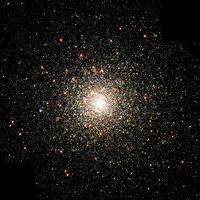SGU Episode 934: Difference between revisions
m (outline done, other than a reference website for the brain stimulation quickie) |
m (I had mixed up the 668 and 934 ep icons) |
||
| Line 46: | Line 46: | ||
|verified = <!-- leave blank until verified, then put a 'y'--> | |verified = <!-- leave blank until verified, then put a 'y'--> | ||
|episodeIcon = File:934 | |episodeIcon = File:934 globular cluster.jpg | ||
|caption = | |caption = Globular clusters are very dense, spherical clusters that contain between around 100,000 and 1 million stars. | ||
|bob =y | |bob =y | ||
Revision as of 11:01, 6 June 2023
| This is a transcript of a recent episode and it is not finished. Please help us finish it! Add a Transcribing template to the top of this transcript before you start so that we don't duplicate your efforts. |
| This episode needs: transcription, formatting, links, 'Today I Learned' list, categories, segment redirects. Please help out by contributing! |
How to Contribute |
You can use this outline to help structure the transcription. Click "Edit" above to begin.
| SGU Episode 934 |
|---|
| June 3rd 2023 |
Globular clusters are very dense, spherical clusters that contain between around 100,000 and 1 million stars. |
| Skeptical Rogues |
| S: Steven Novella |
B: Bob Novella |
C: Cara Santa Maria |
E: Evan Bernstein |
| Quote of the Week |
The plural of anecdote is not data.[note 1] |
attributed to Erika Engelhaupt, |
| Links |
| Download Podcast |
| Show Notes |
| Forum Discussion |
Introduction, SGU's 2024 eclipse plans, Pride Month
Voice-over: You're listening to the Skeptics' Guide to the Universe, your escape to reality.
Quickie with Bob (7:56)
- [url_from_show_notes _article_title_][1]
News Items
S:
B:
C:
J:
E:
(laughs) (laughter) (applause) [inaudible]
Harvesting Energy from Air (18:49)
Breakups and Hindsight Bias (30:41)
AI Seance (43:06)
Monster Stars (56:43)
[use template {{10tothe|##}} for various powers of 10 bob mentions]
Questions/Emails/Corrections/Follow-ups
Correction #1: Which Attenborough (1:05:49)
Question #1: Trees and CO2 (1:10:52)
Hi, I’m a recent listener to your podcast and I have a question for your panel. In the 5/29 issue of the New Yorker Magazine, an article on trees questions the wisdom of mass tree plantings as away to combat global warming. Specifically, it says that although the world’s forests absorb around 16 billion metric tons of carbon dioxide every year, they also emit 8 billion tons. I know that some carbon dioxide is emitted due to respiration at night, but these numbers still seem way off. Can this be true? The online version of the story is dated 5/22/23: What We Owe Our Trees: Forests fed us, housed us, and made our way of life possible. But they can’t save us if we can’t save them. by Jill Lepore
– [listener's name]
Science or Fiction (1:16:02)
Item #1: A newly published clinical study finds that a daily eyedrop can partially reverse myopia (nearsightedness) in children.[6]
Item #2: A study conducted during the pandemic shutdown finds that over the short term reducing pollution increases global warming.[7]
Item #3: Researchers report the production of an organic solar cell with a record-breaking efficiency >19%, which is close to commercial silicon solar cells.[8]
| Answer | Item |
|---|---|
| Fiction | Eyedrops reverse myopia |
| Science | Less pollution, more warming |
| Science | Efficient organic solar cell |
| Host | Result |
|---|---|
| Steve | win |
| Rogue | Guess |
|---|---|
Cara | Less pollution, more warming |
Evan | Less pollution, more warming |
Bob | Eyedrops reverse myopia |
Voice-over: It's time for Science or Fiction.
Cara's Response
Evan's Response
Bob's Response
Steve Explains Item #3
Steve Explains Item #1
Steve Explains Item #2
Skeptical Quote of the Week (1:30:25)
The plural of anecdote is not data.
– attributed by listener to Erika Engelhaupt, freelance science writer
From a post by the Quote Investigator titled "The Plural of Anecdote Is Not Data", "The earliest strong match known to QI appeared in an article by Kenneth Kernaghan and P. K. Kuruvilla in the journal “Canadian Public Administration” in 1982." (Also see Note 1)
Signoff (1:35:57)
S: —and until next week, this is your Skeptics' Guide to the Universe.
S: Skeptics' Guide to the Universe is produced by SGU Productions, dedicated to promoting science and critical thinking. For more information, visit us at theskepticsguide.org. Send your questions to info@theskepticsguide.org. And, if you would like to support the show and all the work that we do, go to patreon.com/SkepticsGuide and consider becoming a patron and becoming part of the SGU community. Our listeners and supporters are what make SGU possible.
Today I Learned
- Fact/Description, possibly with an article reference[9]
- Fact/Description
- Fact/Description
Notes
- ↑ Here's an article: Don't forget: The plural of anecdote is data. "The purpose of this point is to preserve the true meaning of Raymond Wolfinger's oft-misquoted aphorism."
References
- ↑ [url_from_show_notes _publication_: _article_title_]
- ↑ Neurologica: Harvesting Energy from Water Vapor
- ↑ UW-Eau Claire: Can we really foresee break-ups? Hindsight bias in the evaluation of romantic relationships
- ↑ Futurism.com: AI Company Says It'll Perform a Seance on Your Dead Loved Ones
- ↑ Science Alert: Signs of Monster Stars 10,000 Times Our Sun's Mass Found at The Dawn of Time
- ↑ JAMA Ophthalmol: Efficacy and Safety of 0.01% and 0.02% Atropine for the Treatment of Pediatric Myopia Progression Over 3 Years
- ↑ Stockholm University News: Measurements reveal the impact of air pollution on climate and health in southern Asia
- ↑ Clean Energy Reviews: Most Efficient Solar Panels 2023
- ↑ [url_for_TIL publication: title]

|
